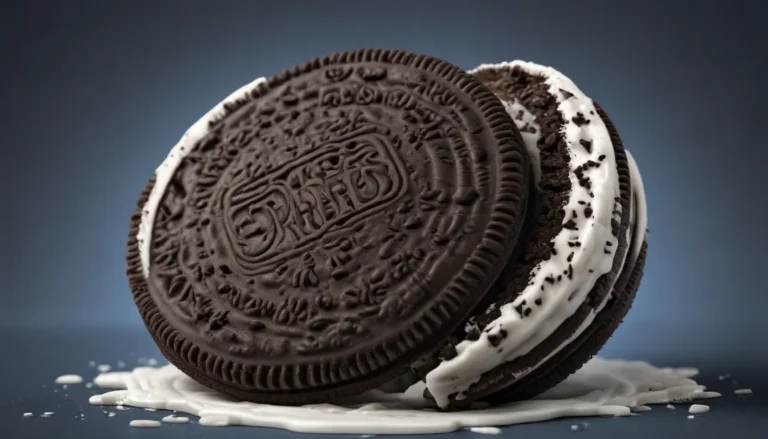The pictures in our articles might not always show exactly what the text is talking about. We use these images to make the article more interesting and eye-catching. They are there to add to the text, but not to replace it or show every detail.
Malt vinegar, with its tangy and robust flavor, has long been a favorite in the culinary world. Derived from malted barley, this condiment adds a unique depth of flavor to dishes and is a staple in British cuisine. But there's more to malt vinegar than just its delicious taste. In this article, we will explore 15 fascinating facts about malt vinegar that will enhance your appreciation for this versatile ingredient.
The Origins of Malt Vinegar
Malt vinegar is made from malted barley through a fermentation process that converts barley starches into alcohol, which is then fermented into acetic acid to create vinegar. This process gives malt vinegar its distinctive flavor profile, rich and slightly sweet with a hint of maltiness.
The Culinary Uses of Malt Vinegar
Malt vinegar is commonly used in British cuisine, particularly to complement dishes such as fish and chips. Its strong flavor cuts through the richness of fried foods, adding a delicious tang. It can also be used in marinades, sauces, and dressings, adding a zesty kick to a variety of dishes.
Surprising Uses of Malt Vinegar
Beyond its culinary uses, malt vinegar is a versatile household cleaner. Its acidic nature makes it effective in removing stains, killing bacteria, and neutralizing odors. Additionally, malt vinegar is often used in pickling due to its strong flavor and acidity, enhancing the tanginess of pickled items.
Health Benefits of Malt Vinegar
Malt vinegar contains acetic acid, which has been associated with several potential health benefits. It may aid in weight management, blood sugar control, and digestion. However, more research is needed to fully understand the extent of these benefits. The presence of antioxidants in malt vinegar also contributes to its potential health benefits and the protection of the body against free radicals.
Making Malt Vinegar at Home
For those feeling adventurous, making malt vinegar at home is a possibility. With patience and a few supplies like malted barley, water, and a fermentation vessel, you can create your own flavorful malt vinegar. The process may take time, but the end result can be rewarding and delicious.
Gluten Content in Malt Vinegar
While malt vinegar is made from malted barley, which contains gluten, the fermentation process may break down some components of the grains. However, malt vinegar may still contain traces of gluten, making it unsuitable for individuals with gluten sensitivities or allergies. It’s essential to be cautious when consuming malt vinegar if you have a gluten intolerance.
Exploring the History of Malt Vinegar
Malt vinegar has a rich history dating back centuries. Originally made by the ancient Babylonians, malt vinegar has remained a popular condiment and ingredient throughout the years. Its unique flavor and versatility have solidified its place in culinary traditions around the world.
Incorporating Malt Vinegar into Cooking
Malt vinegar's tangy flavor makes it a great addition to various dishes and cuisines. It can be used to add depth to salads, marinades, sauces, and dressings, as well as deglazing pans and enhancing the flavors of soups and stews. Additionally, malt vinegar can be used to tenderize meat and infuse it with a delicious tanginess, making it a versatile ingredient in cooking.
Household Applications of Malt Vinegar
Aside from its culinary uses, malt vinegar can be utilized as a natural weed killer due to its acetic acid content. When applied directly to weeds, malt vinegar can help eliminate them naturally. However, it is important to exercise caution as it may also affect other plants. Additionally, the acidity of malt vinegar makes it an effective cleaner for glass, countertops, and other surfaces in the household.
Homemade Remedies with Malt Vinegar
Some people believe that malt vinegar can be used as a remedy for minor skin irritations, sore throats, and even heartburn. While these claims are largely anecdotal, the acidic nature of malt vinegar may provide temporary relief for certain ailments. It is essential to consult with a healthcare professional before using malt vinegar for medicinal purposes.
Conclusion
In conclusion, malt vinegar is a versatile and flavorful condiment with a rich history and an array of uses. Whether you're adding it to your favorite recipes, exploring homemade creations, or utilizing it for cleaning purposes, malt vinegar offers a unique tangy flavor that enhances a variety of dishes. With its potential health benefits and versatility in both culinary and household applications, malt vinegar is a pantry staple that should not be overlooked.
FAQs About Malt Vinegar
- What is malt vinegar?
-
Malt vinegar is a type of vinegar made from fermented malted barley, known for its rich flavor and distinctive aroma.
-
How is malt vinegar made?
-
Malt vinegar is produced through a two-step fermentation process, starting with malted barley that is fermented into a beer-like liquid, which is then further fermented into vinegar.
-
Can malt vinegar be used for cooking?
-
Yes, malt vinegar is commonly used in cooking to add flavor to a variety of dishes, including marinades, dressings, and sauces.
-
Is malt vinegar gluten-free?
-
No, malt vinegar is not gluten-free as it is made from barley, which contains gluten. Individuals with gluten sensitivities or allergies should opt for alternative vinegars like apple cider or rice vinegar.
-
Can malt vinegar be used for cleaning?
-
Yes, malt vinegar can be used as a natural cleaning agent due to its acidity, which makes it effective in cutting through grease and grime on various surfaces.
-
Does malt vinegar have any health benefits?
-
Malt vinegar contains acetic acid, which has been associated with potential health benefits such as aiding digestion, blood sugar control, and weight management when consumed as part of a balanced diet.
-
Can malt vinegar be used as a substitute for other vinegars?
-
Yes, malt vinegar can be used as a substitute for other vinegars in most recipes, but keep in mind that it has a stronger flavor, requiring adjustment of quantities.
-
How should malt vinegar be stored?
- Malt vinegar should be stored in a cool, dark place away from direct sunlight and heat, with the bottle tightly sealed to maintain its quality and flavor.
In conclusion, malt vinegar is a flavorful and versatile condiment that offers a world of culinary possibilities. From its origins in malted barley to its uses in cooking, cleaning, and beyond, malt vinegar adds a unique tanginess to dishes and provides potential health benefits. So, next time you reach for a bottle of malt vinegar, savor its rich history and explore the endless ways it can elevate your culinary creations.






